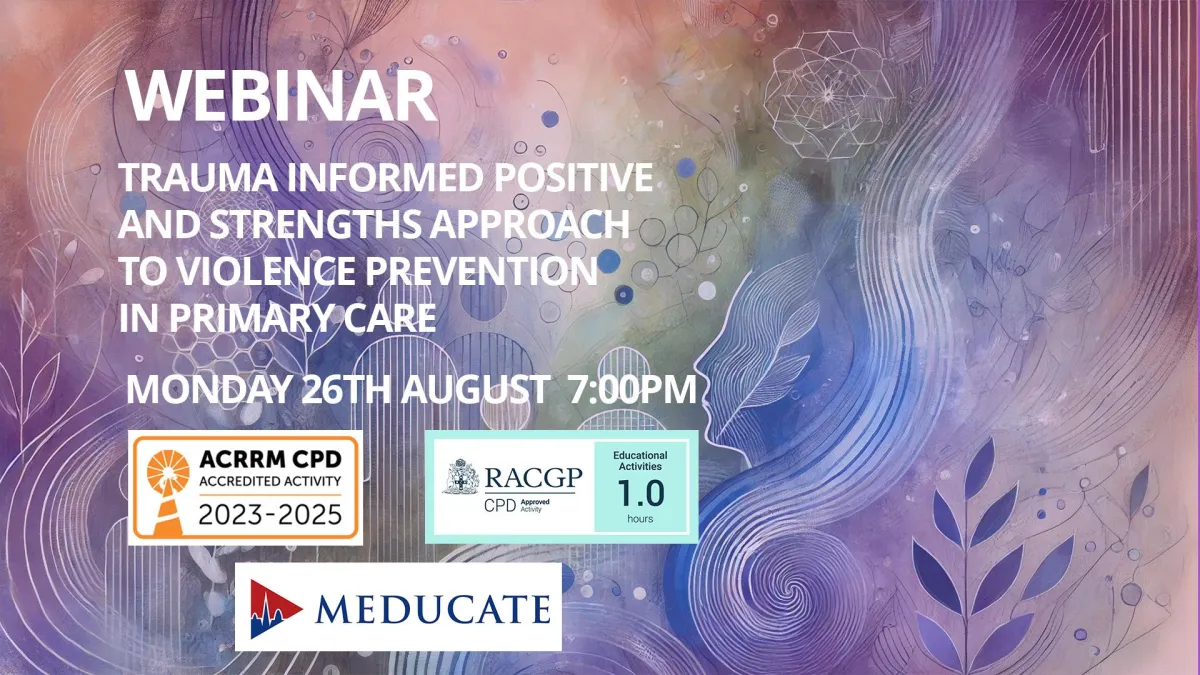WEBINAR
Trauma informed positive and strengths approach to violence prevention in primary care

Join us for a transformative webinar on "Trauma-Informed, Positive, and Strengths-Based Approaches to Violence Prevention in Primary Care."
In this webinar, we will explore a comprehensive framework for violence prevention that integrates trauma-informed care with positive and strengths-based approaches. This model aims to make prevention efforts more accessible and effective for practitioners, fostering a safer and more supportive environment for both patients and providers
WEBINAR.
Strength-Based, Trauma-Informed Approaches to Violence Prevention in Primary Care
Join us for a transformative webinar on "Trauma-Informed, Positive, and Strengths-Based Approaches to Violence Prevention in Primary Care."
In this webinar, we will explore a comprehensive framework for violence prevention that integrates trauma-informed care with positive and strengths-based approaches. This model aims to make prevention efforts more accessible and effective for practitioners, fostering a safer and more supportive environment for both patients and providers.
WEBINAR Monday, 26th August at 7PM AEST
Hosted by: Dr. Ferghal Armstrong and Dr. Bill Liley
Dr Bill Liley is a distinguished expert in trauma-informed care and violence prevention, with extensive experience in primary care. He is a dedicated practitioner and advocate for integrating positive and strengths-based approaches into clinical practice, aiming to create safer and more supportive environments for both patients and healthcare providers.
Dr Liley is renowned for his work on "The Cooktown – 10," a pioneering model that exemplifies trauma-informed primary care in Australia. His innovative framework has made significant strides in making prevention opportunities more accessible and practical for practitioners.
With a deep commitment to education and systemic change, Dr Liley frequently speaks at conferences and webinars, sharing his insights and strategies for addressing violence and its harms in clinical settings. His expertise spans a broad range of topics, including the pathogenesis of violence, diagnostic dilemmas in primary care, and the application of trauma-informed principles to enhance patient outcomes.
Dr Liley's work is grounded in a belief that primary care, when delivered through a trauma-informed lens, is most effective in supporting individuals and communities. His contributions to the field are widely recognised, making him a leading voice in violence prevention and trauma-informed practice.

Dr Ferghal Armstrong
Addiction Medicine Specialist, FRACGP FAChAM ASLM

Dr Bill Liley
Dr Bill Liley, MBBS, FACRRM, FRACGP, DRANZCOG

RACGP ID: 943791. ACRRM ID: 34198
Monday, 26th August at 7PM AEST
Hosted by: Dr. Ferghal Armstrong and Dr. Bill Liley

Dr Ferghal Armstrong
Addiction Medicine Specialist, FRACGP FAChAM ASLM
Co Founder and CEO, Meducate

Dr Bill Liley
Dr Bill Liley, MBBS, FACRRM, FRACGP, DRANZCOG
Co-founder, Managing Director of Violence Prevention Australia
Dr Bill Liley is a distinguished expert in trauma-informed care and violence prevention, with extensive experience in primary care. He is a dedicated practitioner and advocate for integrating positive and strengths-based approaches into clinical practice, aiming to create safer and more supportive environments for both patients and healthcare providers.
Dr Liley is renowned for his work on "The Cooktown – 10," a pioneering model that exemplifies trauma-informed primary care in Australia. His innovative framework has made significant strides in making prevention opportunities more accessible and practical for practitioners.
With a deep commitment to education and systemic change, Dr Liley frequently speaks at conferences and webinars, sharing his insights and strategies for addressing violence and its harms in clinical settings. His expertise spans a broad range of topics, including the pathogenesis of violence, diagnostic dilemmas in primary care, and the application of trauma-informed principles to enhance patient outcomes.
Dr Liley's work is grounded in a belief that primary care, when delivered through a trauma-informed lens, is most effective in supporting individuals and communities. His contributions to the field are widely recognised, making him a leading voice in violence prevention and trauma-informed practice.
What You Will Learn:
Systemic Framework:
Gain an in-depth understanding of the pathogenesis model for explaining and addressing harms in clinical practice.
Learn how systemic factors contribute to violence and how to address them holistically.
Acquire skills to apply a trauma-informed lens to your primary care practice.
Understand the principles of trauma-informed care and how they can enhance patient outcomes and support practitioner resilience.
Explore ways to recognise and respond to trauma symptoms and behaviours in a clinical setting.
Discover techniques to leverage patients' strengths, promoting positive change and resilience.
Learn how to shift the focus from deficits to strengths, empowering patients in their healing journey.
Understand the role of positive reinforcement and strength-based interventions in violence prevention.
Learning Outcomes
By the end of this webinar, participants will be able to:
Articulate the principles of the pathogenesis model and its application in understanding and addressing clinical harms.
Apply trauma-informed care principles in primary care settings to improve patient outcomes and practitioner well-being.
Implement positive and strengths-based strategies to enhance violence prevention efforts and promote patient resilience.
Recognise and respond to trauma symptoms and behaviours, creating a supportive and safe environment for patients.
Empower patients through strength-based interventions, shifting focus from deficits to strengths and fostering positive change.
Interactive Q&A Session

Following the presentations, there will be an interactive Q&A session where you can engage with Dr. Armstrong and Dr. Liley, ask questions, and discuss practical applications of the concepts presented.
Frequently Asked Questions
Who should attend this webinar?
This webinar is ideal for primary care practitioners, including doctors, nurses, social workers, mental health professionals, and anyone involved in patient care who is interested in learning more about trauma-informed and strengths-based approaches to violence prevention.
Will the webinar be Recorded
Yes it will be recorded and will be available for replay to our premium subscribers only.
What technical requirements are needed to attend the webinar?
The webinar will be via Zoom
Can I ask questions during the webinar?
Yes, there will be an interactive Q&A session following the presentations. You can submit your questions during the webinar, and Dr. Armstrong and Dr. Liley will address them live.
How will this webinar help me in my practice?
This webinar will equip you with practical tools and knowledge to integrate trauma-informed and strengths-based approaches into your practice. By applying these strategies, you can enhance patient outcomes, improve practitioner resilience, and create a safer, more supportive environment for both patients and providers. This comprehensive approach can lead to more effective violence prevention, better patient relationships, and overall improved quality of care in your practice.
Can I share the webinar details with my colleagues?
Absolutely! We encourage you to share the webinar details with any colleagues who might benefit from attending. The more health professionals equipped with these insights, the better we can collectively enhance patient care.
What should I do if I experience distress during the webinar?
This webinar will discuss sensitive topics related to violence, including its origins and impacts. Support resources will be available and we encourage you to seek additional support as needed. Remember, "there is never a bad time to call.


©2024 – Meducate Pty Ltd ©
